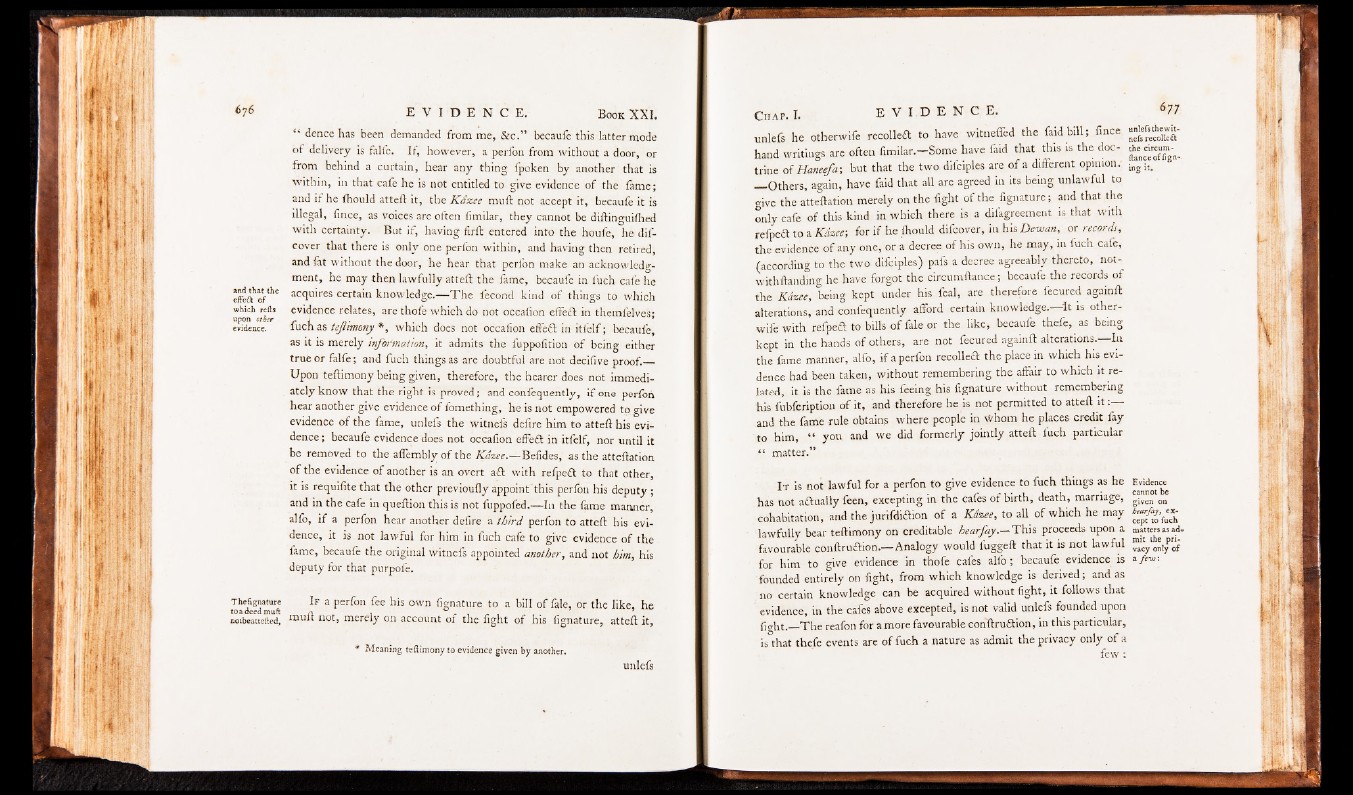
and that the
effect of
which refts
upon ether
evidence.
Thefignature
toadeed muft
notbeattefted,
“ dence has been demanded from me, &c.” becaufe this latter mode
of delivery is falfe. If, however, a perfon from without a door, or
from behind a curtain, hear any thing fpoken by another that is
within, in that cafe he is not entitled to give evidence of the fame;
and if he ihould atteft it, the Kazee muft not accept it, becaufe it is
illegal, fince, as voices are often fimilar, they cannot be diftinguifhed
with certainty. But if, having firft entered into the houfe, he discover
that there is only one perfon within, and having then retired,
and fat without the door, he hear that perfon make an acknowledgment,
he may then lawfully atteft the fame, becaufe in fuch cafe he
acquires certain knowledge.— The fecond kind of things to which
evidence relates, are thofe which do not occalion effeft in themfelve's;
fuch as tejiimony * , which does not occalion effeft in itfelf; becaufe,
as it is merely information, it admits the fuppofition o f being either
true or falfe; and fuch things as are doubtful are not decilive proof.__
Upon teftimony being given, therefore, the hearer does not immediately
know that the right is proved; and confequently, if one perfon
hear another give evidence of fomething, he is not empowered to give
evidence of the fame, unlefs the witnefs defire him to atteft his evidence;
becaufe evidence does not occafion effeft in itfelf, nor until it
be removed to the aflembly o f the Kazee.— Befides, as the atteftation
of the evidence of another is an overt aft with refpedt to that other,
it is requifite that the other previoufly appoint this perfon his deputy;
and in the cafe in queftion this is not fuppofed.— In the fame manner,
alfb, i f a perfon hear another delire a third perfon to atteft his evidence,
it is not lawful for him in fuch cafe to give evidence of the
fame, becaufe the original witnefs appointed another, and not him, his
deputy for that purpofe.
If a perfon fee his own fignature to a bill of fale, or the like, he
muft not, merely on account of the fight of his fignature, atteft it,
* Meaning teftimony to evidence given by another.
unlefs
unlefs he otherwife recollea to have witneffed the find bill; fince
hand writings arc often fimilar.— Some have faid that this is the doctrine
of Haneefa-, but that the two difciples are of a different opinion.'
— Others, again, have faid that all are agreed in its being unlawful to
give the atteftation merely on the fight of the fignature; and that the
only cafe of this kind in which there is. a difagreement is that with
refpeft to a Kazee; for if he fhould difeover, in his Dewan, or records,
the evidence of any one, or a decree of his own, he may, in fuch cafe,
(according to the two difciples) pafs a decree agreeably thereto, not-
withftanding he have forgot the circumftance; becaufe the records of
the Kdzee, being kept under his feal, are therefore fecured againft
alterations^ and confequently afford certain knowledge.— It is other-
wife with refpedl to bills of fale or the like, becaufe thefe, as being
kept in the hands of others, are not fecured againft alterations. In
the fame manner, alfo, if a perfon recoiled! the place in which his evidence
had been taken, without remembering the affair to which it related,
it is the fame as his feeing his fignature without remembering
his fubfcription of it, and therefore he is not permitted to atteft i t :—
and the fame rule obtains where people in whom he places credit fay
to him, “ you. and we did formerly jointly atteft fuch particular
“ matter.”
It is not lawful For a perfon to give evidence to fuch things as he
has not actually feen, excepting in the cafes of birth, death, marriage,
cohabitation, and the jurifdidtion of a Kdzee, to all of which he may
lawfully bear teftimony on creditable hearfay.— This proceeds upon a
favourable conftruftion.— Analogy would fuggeft that it is not lawful
for him to give evidence in thofe cafes alio; becaufe evidence is
founded entirely on fight, from which knowledge is derived; and as
no certain knowledge can be acquired without fight, it follows that
evidence, in the cafes above excepted, is not valid unlefs founded upon
fio-ht._The reafon for a more favourable conftrudtion, in this particular,
is that thefe events are of fuch a nature as admit the privacy only of a
few :
unlefs the witnefs
recollect
the circumftance
of fign-.
ing it.
Evidence
cannot be
given on
hearfay, except
to fuch
matters as ad*
mit the privacy
only o f
a few".